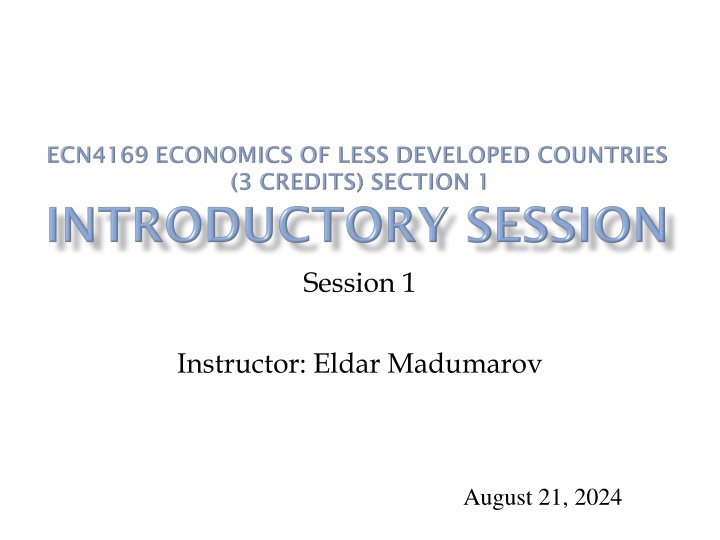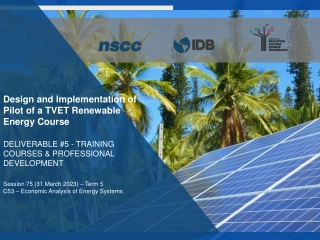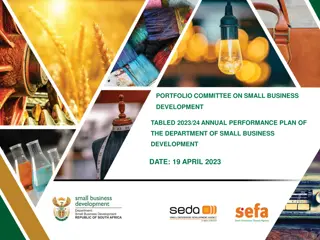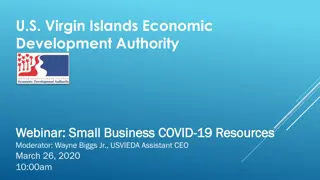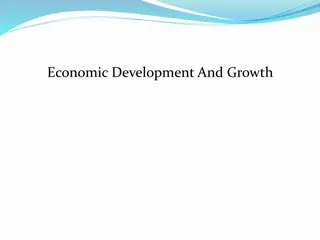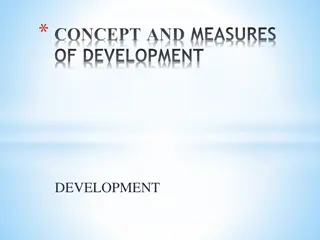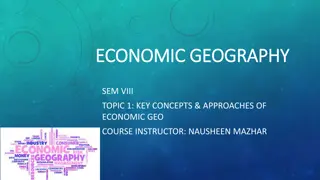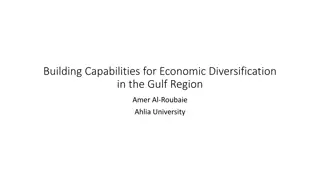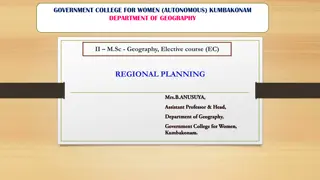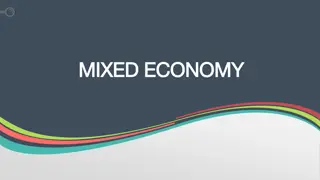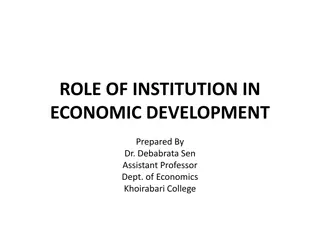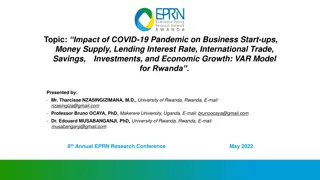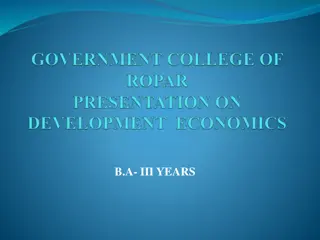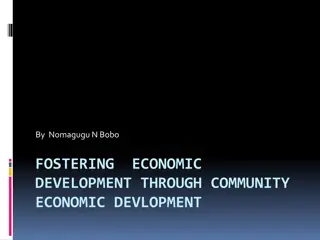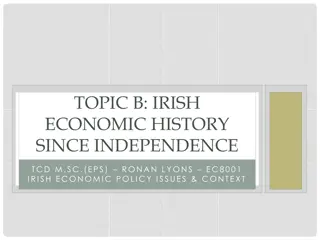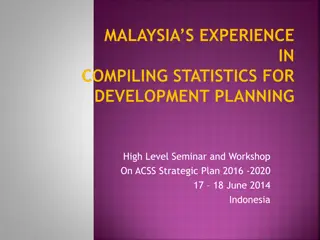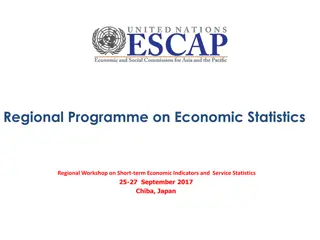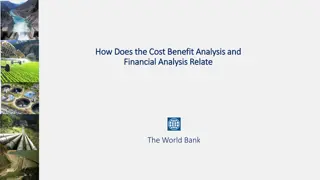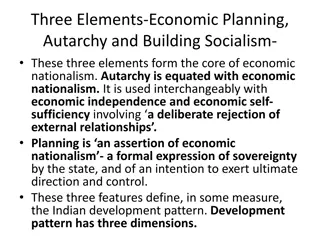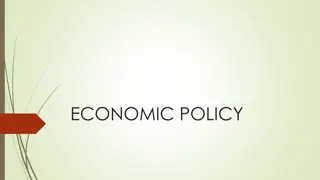Economic Development and Analysis
This course module delves into the problems and features of developing economies, with a focus on modern analytical quantitative approaches. Covering topics such as economic development processes, income inequality, poverty, and international trade strategies, students will gain insights into key principles and policies. By exploring theories of growth, poverty dynamics, and population economics, learners will develop a comprehensive understanding of the complexities surrounding economic development.
Download Presentation

Please find below an Image/Link to download the presentation.
The content on the website is provided AS IS for your information and personal use only. It may not be sold, licensed, or shared on other websites without obtaining consent from the author.If you encounter any issues during the download, it is possible that the publisher has removed the file from their server.
You are allowed to download the files provided on this website for personal or commercial use, subject to the condition that they are used lawfully. All files are the property of their respective owners.
The content on the website is provided AS IS for your information and personal use only. It may not be sold, licensed, or shared on other websites without obtaining consent from the author.
E N D
Presentation Transcript
Session 1 Instructor: Eldar Madumarov August 21, 2024
General Information Questionnaire Questions Short Clip on Countries across Time Some Notions 8/21/2024 ECN4169 2
Class meets: Venue: Course credits: Mon, Wed, Fri 10:00-10:50 VB 208 3 Credits/5 ECTS Credits Instructor: Office: Phone: Email: Office Hours: Eldar Madumarov, PhD Room 507/ Valikhanov Building +7 (727) 2704271 x 3071 madumarov@kimep.kz Mon, Wed, Fri 11:00-12:00 or by appointment 8/21/2024 ECN4169 3
COURSE DESCRIPTION The module aims to introduce students to the problems and features of developing economies, and it is based on the modern analytical quantitative approach adopted by the main international development institutions, with an emphasis on the most recent advances in the field. The course focuses on a set of issues which comprises, among other topics, theoretical foundations of the process of economic development, income inequality and poverty, agricultural transformation, international trade and development strategy. 8/21/2024 ECN4169 4
Learning objectives Understanding of the main principles and concepts of the development process Grasp the essential domestic problems and policies Comprehension of the essential international problems and policies 8/21/2024 ECN4169 5
Intended learning outcomes Upon the completion of the course students will be able to: Define the role of institutions in the process of economic development, Characterize and classify the less developed countries in line with different criteria, Get to know the relevant details of the classic and modern theories of growth and development, Acquire the knowledge on the link(s) between poverty, inequality and development, Know the relevant details about the linkage between population growth and economic development, 8/21/2024 ECN4169 6
State the rationale for rural-urban migration, Determine the roles of market, state, and civil society in the process of economic transformation, Explain the role of international trade in the development process, Use the balance of payments mechanics in explaining the problems of indebtedness, Characterize the role of foreign finance, investment and aid in the process of economic development, Determine the role of finance and fiscal policy in the development process. 8/21/2024 ECN4169 7
Relationship of course and program Prerequisites: 90 credit hours. The given course is deemed as a course building upon and encompassing an array of economic disciplines including ECN3081 Micro- and ECN3082 Macroeconomics, ECN4122 Labor Economics and ECN4112 International Trade, Economic History and History of Economic Thought, etc. 8/21/2024 ECN4169 8
Teaching and learning philosophy and methodology The instructor steaching philosophy. Personal Objectives:The course s instructor will be assisting students, coordinating their learning process and assisting students in mastering the stuff of the course. Teaching and learning approaches: In order to attain the stated learning objectives, the instructor will use an array of suited teaching and assessment techniques. 8/21/2024 ECN4169 9
Course teaching and learning methodology: The instructor s teaching objectives will be achieved through a myriad of teaching techniques that include but are not limited to introductory and comprehensive lectures, interactive tutorial sessions, learning in-class experiments. Furthermore, the course s assessment will take different forms. The students performance will be evaluated through home assignments, quizzes, in-class exercises along with tests and examinations. 8/21/2024 ECN4169 10
Course learning activities In-class lectures will be combined with interactive tutorial sessions. These activities are supposed to be complemented by independent work of students. The course requires that work independently at least six hours a week. Students are advised to make the most of instructional materials and lecture slides. Your regular attendance of classes is to be complemented by your independent work equaling roughly to 5-6 hours per week (75-90 hours per semester). Hereby this time budget is to be allocated between pre-reading, post-reading and preparation for assessment activities. 8/21/2024 ECN4169 11
Assessment scheme During this semester the students taking the course are expected to be tested through two midterm exams and one final exam. These combined will determine the final grade. The breakdown is as follows: Attendance & Participation Midterm Exam 1 Midterm Exam 2 Final Exam Total 20% 20% 20% 40% 100% 8/21/2024 ECN4169 12
Course policies and instructors expectations of students Students are supposed to come to class prepared. This implies that you will have read the text and solved the assigned exercises. Good attendance will in any case pay off. No make-ups for assessment sessions. Do not miss the days on which exams and quizzes are held. If you miss them without valid any excuse, you will lose points. Moreover, begging for undeserved additional points is discouraged and might be penalized. Plagiarism along with cheating will be penalized appropriately. Please check the Catalog for details. 8/21/2024 ECN4169 13
Instructional resources Required textbook: Todaro M. and Smith S., Economic Development, tenth edition, 2009, Pearson Addison-Wesley. Supplementary textbooks: Weil D.N., Economic Growth, second edition, 2009, Pearson International. Thirlwall A. P., Growth and development with special reference to developing economies, eighth edition, 2006, Palgrave Macmillan. Easterly W., The elusive quest for growth: economists adventures and misadventures in the tropics, 2002, First MIT Press paperback edition. 8/21/2024 ECN4169 14
LITERATURE 8/21/2024 ECN4169 ECN4169 15 15
Reference Week Dates Subject/Topic Chapter 1 1 8/21 8/23 Economics, Institutions, and Development Chapter 2 2 8/26 8/28 8/30* Comparative Economic Development Chapter 3 3 9/2 9/4 9/6 Classic Theories of Economic Growth and Development Chapter 4 4 9/9 9/11 9/13 Contemporary Models of Development and Underdevelopment Chapter 5 5 9/16 9/18 9/20 Poverty, Inequality, and Development ME1 Population Growth and Economic Development Chapter 6 6 9/23 9/25 9/27 Chapter 7 7 9/30 10/2 10/4 Urbanization and Rural-Urban Migration 8 10/7-10/13 Midterm Break Reading Week 10/14 10/16 10/18 Chapter 8 9 Human Capital: Education and Health in Economic Development 10/21 10/23 10/25** Chapter 9 10 Agricultural Transformation and Rural Development 10/28 10/30 11/1 11/4 11/6 11/8 11/11 11/13 11/15 11/18 11/20 11/22 11/25 11/27 11/29 12/2 12/4 12/6 ME2 Development Policymaking and the Roles of Market, State, and Civil Society Chapter 11 11 Chapter 12 12 International Trade Theory and Development Strategy Balance of Payments, Developing-Country Debt, and the Macroeconomic Stabilization Controversy Chapter 13 13 Chapter 14 14 Foreign Finance, Investment, and Aid: Controversies and Opportunities Chapter 15 15 Finance and Fiscal Policy for Development 16 Revision & FE Preparation 17 12/9 Ch 3,4,7,12- 15 FE 18 8/21/2024 ECN4169 16
Means of Communication Certain files will be placed on L-Drive Almost all of my files will have ECN4169_YYMMDD-WD in their names. You can easily and quickly sort and find the appropriate file. I prefer emails to phone calls. Please don t disturb me beyond my office hours. I suggest you to check regularly your @kimep.kz accounts. 8/21/2024 ECN4169 17
ECN4169 Questionnaire -Please fill out the questionnaire and submit your answers by 17:00 Fri, Sep 6, 2024. F2024 ECN4169 Questionnaire (google.com) 8/21/2024 ECN4169 18
1. Which of the following is not an important objective of development? a. increases in per capita income b. the expansion of available choices c. increases in individual and national self-esteem d. all of the above are important objectives of development 8/21/2024 ECN4169 19
2. The Millennium Development Goals include a. eliminating the proportion of people living on less than $1 per day. b. universal primary education. c. increasing exports by one half. d. all of the above. 8/21/2024 ECN4169 20
3. It is not possible for a country to experience a. economic development without economic growth. b. economic growth without economic development. c. economic growth and economic development simultaneously. d. both (a) and (b) are correct. 8/21/2024 ECN4169 21
4. A good definition of the meaning of development is the a. elimination of absolute poverty. b. improvement in the quality of life. c. fulfillment of the potential of individuals. d. all of the above. 8/21/2024 ECN4169 22
Please watch it carefully to answer the following questions: Is there any problem in that cross-country comparison across the last 200 years? How come that in certain countries some regions data may substantially deviate from the national average? 8/21/2024 ECN4169 23
8/21/2024 ECN4169 24
Developing countries Development Development Economics Gross national income (GNI) Income per capita Institutions Less developed countries (LDCs) Millennium Development Goals (MDGs) More developed countries (MDCs) 8/21/2024 ECN4169 25
